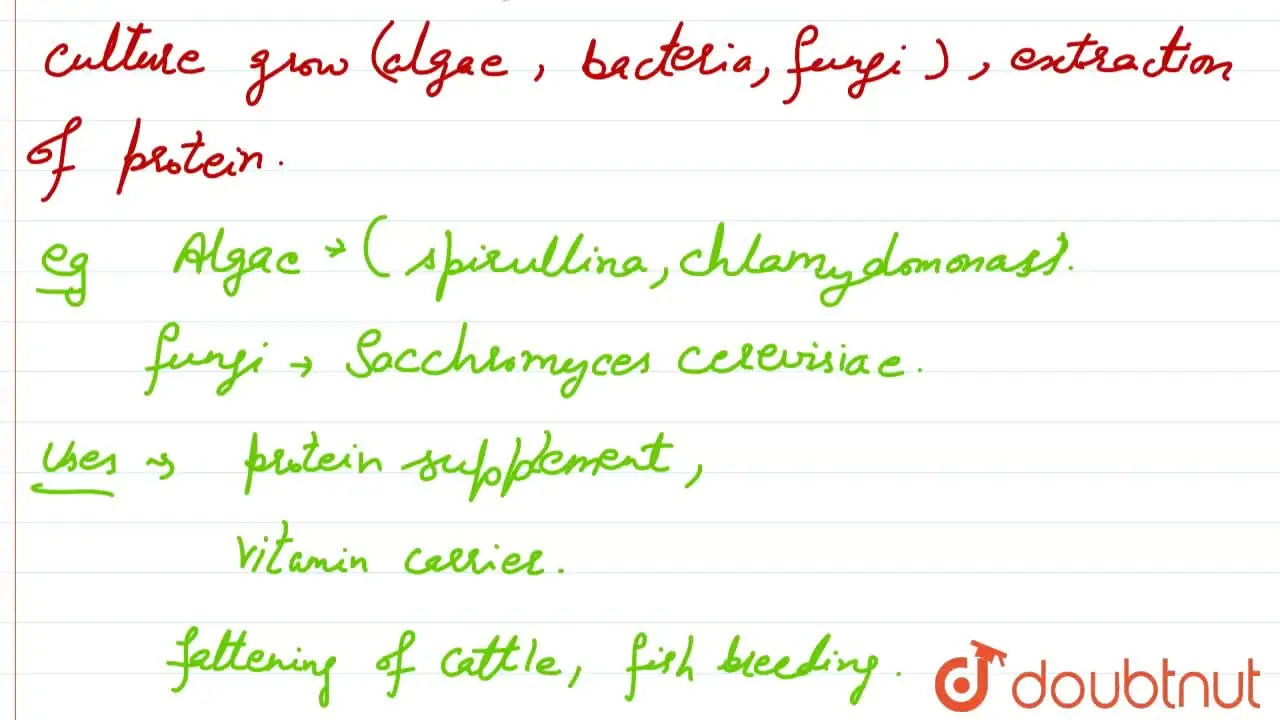Write a short note on Single Cell Protein. Solution in Punjabi
Single Cell Protein (SCP).
As we know demand of food is increasing due to increase in human and animal population, the shift from grain to meat diets does not solve the problem as it takes 3-10 kg of grain to produce 1 kg of meat by animal farming. More than 25 per cent out of human population is suffering from hunger and malnutrition. One of the alternate sources of proteins for animal and human nutrition is single cell protein (SCP). Microorganisms are used for the preparation of fermented foods (e.g., cheese, butter, idlis, etc.). Some microorganisms (e.g., blue green algae-Spirulina and mushrooms-fungi) are being used as human food. Now efforts are being made to produce microbial biomass using low cost substrates. Microbes like Spirulina can be grown on waste water from potato processing plants (containing starch), straw, molases, animal manure and even sewage, to produce food rich in proteins, minerals, fat, carbohydrates and vitamins. This biomass is used as food by humans. The cell from microorganisms such as bacteria, yeasts, filamentous algae, are treated in various ways and used as food, are called single cell protein (SCP). The term SCP does not indicate its actual meaning because the biomass is not only obtained from unicellular microorganisms but also from mulicellular microorganisms.
Thus SCP is produced using bacteria,, algae, fungi (yeasts, etc). The substrates used for SCP production range from CO, (used by algae) through industry effluents like whey (water of curd), etc. to low-cost organic materials like saw dust and paddy straw. Commercial production of SCP is mostly based on yeasts and some other fungi, e.g., Fusarium graminearum. In most cases, SCP has to be processed to remove the excess of nucleic acids. SCP is rich in high quality protein and is poor in fats. Both high quality of protein and low quantity of fats constitute good human food. It has been estimated that a 250 kg cow produces 200 g of protein per day. In the same period 250 g of a microorganism like Methylophilus methylotrophus because of its high content of biomass production and growth, can produce about 25 tonnes of protein.
Advantages of SCP are as follows. (i) It provides a protein rich supplement in human diet, (ii) It reduces the pressure on agricultural production systems for the supply of the required proteins. (iii) SCP production is based on industrial effluents so it helps to minimise environmental pollution.
Related Playlists
- BOOK - BETTER CHOICE PUBLICATIONCHAPTER - STRATEGIES FOR ENHANCEMENT IN FOOD PRODUCTION EXERCISE - LONG ANSWER TYPE QUESTIONS13videos
STRATEGIES FOR ENHANCEMENT IN FOOD PRODUCTION
- BOOK - BETTER CHOICE PUBLICATIONCHAPTER - STRATEGIES FOR ENHANCEMENT IN FOOD PRODUCTION EXERCISE - MOST EXPECTED QUESTIONS19videos
STRATEGIES FOR ENHANCEMENT IN FOOD PRODUCTION
- BOOK - BETTER CHOICE PUBLICATIONCHAPTER - SEXUAL REPRODUCTION IN FLOWERING PLANTS EXERCISE - MOST EXPECTED QUESTIONS20videos
SEXUAL REPRODUCTION IN FLOWERING PLANTS
Similar Questions
Discuss the role of plant tissue culture in increasing food production.
03:24View SolutionMention the strategy used to increase homozygosity in cattle for desired traits.
15:10View SolutionHow do pollen grains withstand high temperature and strong acids?
06:11View SolutionWrite a short note on the importance of microbes in
(A) SCP (Single cell protein) (B) Soil01:23View SolutionWrite notes on (i) Single cell protein (ii) Totipotency.
02:12View SolutionWrite short note on Proteins
02:37View SolutionWrite a note on single cell protein.
03:16View Solutionप्रोटीन पर संक्षिप्त टिप्पणियाँ लिखिए-
03:04View SolutionWrite a short note on single cell protein .
04:10View SolutionWrite a short note on Single Cell Protein.
03:35View SolutionWhat are single cell proteins ? Write the advantages and production of single cell proteins.
04:21View SolutionWrite short note on Protein
02:54View SolutionWrite short note on Primary protein
02:23View SolutionWrite short note on Secondary protein
03:55View SolutionWrite short note on Tertiary protein
03:02View SolutionWrite notes with 2 to 3 important points : Single cell protein
02:25View Solution


